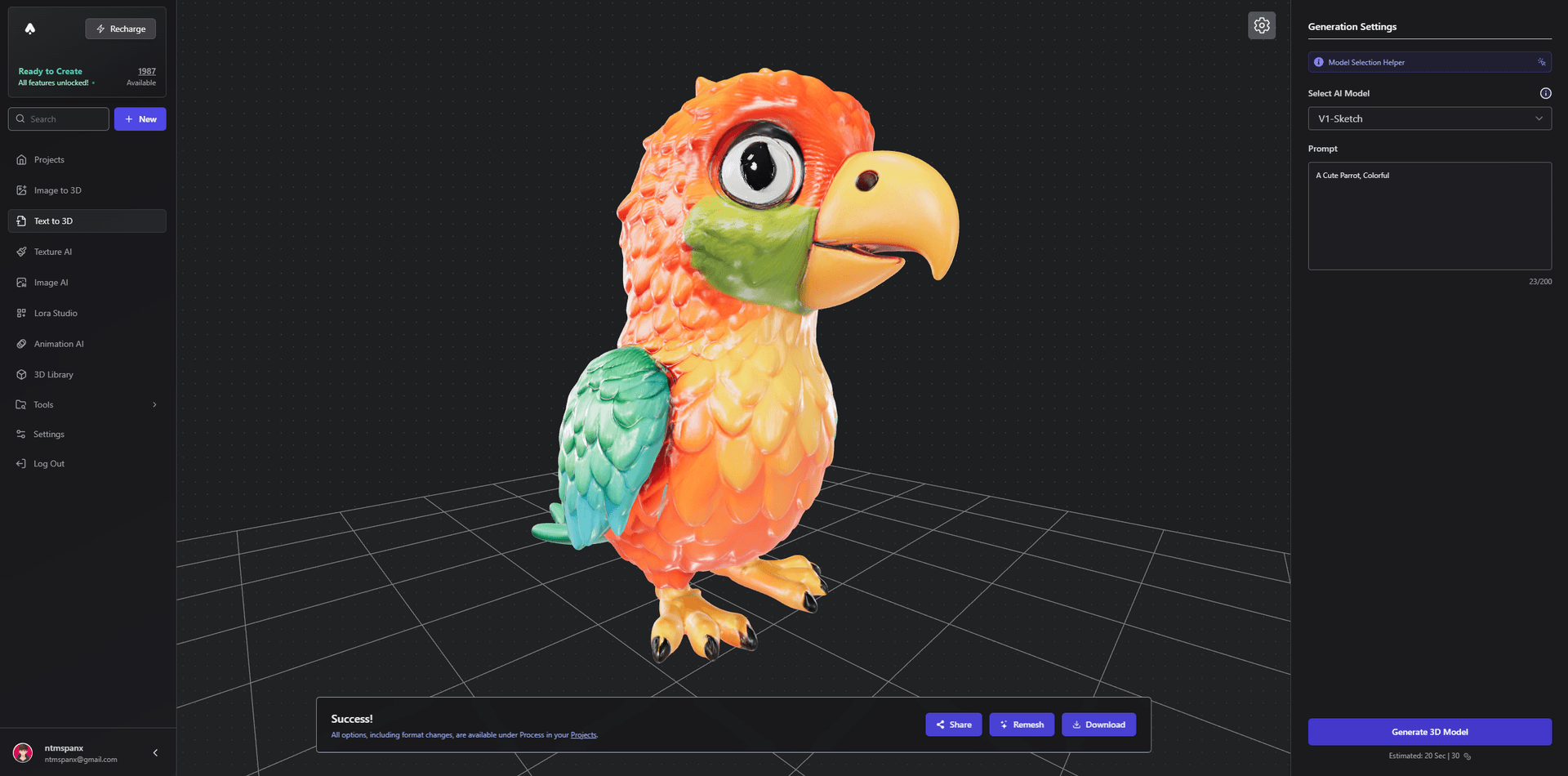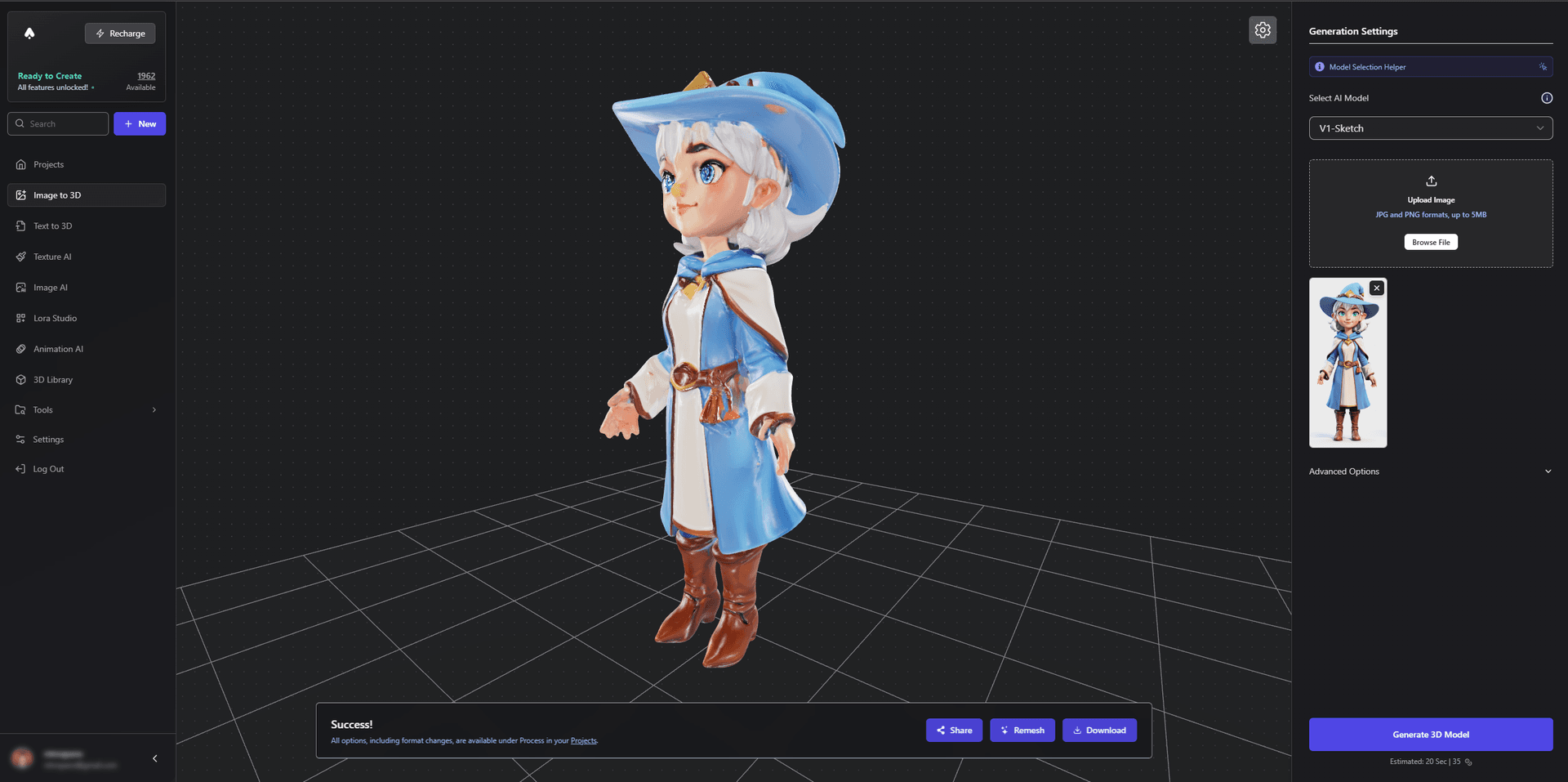Tutorial: Generating Game Development Assets with AI (Props, Weapons & More)
Game development requires countless assets, from simple props to complex characters. This comprehensive guide will show you how to use AI to generate these assets efficiently, with a special focus on props and kitbashing techniques.
Understanding Game Asset Generation
Before diving into creation, it's crucial to understand what makes a good game asset. Game assets need to be optimized for performance while maintaining visual appeal. Using 3D AI Studio, we can achieve both quality and efficiency in our asset creation pipeline.

Creating Base Props and Weapons
We'll start with generating basic props using our text-to-3D system. Visit Text to 3D to begin the process.
For optimal results when describing props, use specific terminology. Instead of "a sword," write "a medieval steel longsword with leather-wrapped handle and ornate brass guard." This level of detail helps the AI understand exactly what you want to create.

Texture Enhancement Workflow
Once you have your base models, improving textures is crucial for game-ready assets. Our Texture Generation tool can significantly enhance visual quality.
The texture enhancement process involves several steps:

First, upload your initial texture to the texture generation tool. You can specify exactly what type of material you want, such as "worn metal with rust spots" or "polished wood with visible grain." The AI will generate high-quality PBR textures that are game-ready.
Custom Style Training for Consistent Assets
Creating a consistent style across all your game assets is crucial. Using our Lora Studio, you can train the AI to understand your game's specific style.

To train a custom style, gather reference images that represent your game's visual style. The more consistent your reference images are, the better the results will be. Upload these images to Lora Studio and let the AI learn your specific style preferences.
Kitbashing with AI-Generated Parts
Kitbashing is a powerful technique for creating complex assets from simple parts. Using our Image to 3D tool, you can generate individual components for kitbashing.

The process involves generating multiple simple parts and combining them into more complex assets. Generate basic shapes and components, then use 3D modeling software to combine them into unique creations.
Character Asset Creation
While our focus is on props, characters are an essential part of game development. Using 3D AI Studio, you can generate base character models that can be customized and rigged for gameplay.

Start with a basic character description, then use our tools to refine the model's style, proportions, and details to match your game's requirements.
Advanced Texture Workflows
For more complex assets, combining multiple AI-generated textures can create unique results. Start with a base texture, then layer additional textures for wear, damage, or special effects.

The key to successful texture layering is understanding how different materials interact. Metal might show wear differently than wood, and stone will weather differently than fabric.
Asset Library Management
Creating a consistent game asset library is crucial for efficient development. Using our Community Creations feature, you can save and organize your generated assets for easy access.
Post-Processing for Game Engines
After generating your assets, they'll need to be prepared for your game engine. This includes:

The final preparation steps include optimizing polygon counts, creating proper LODs, and ensuring proper texture compression for game engine implementation.
Resource Optimization Techniques
Game development requires careful resource management. When generating assets, consider these optimization techniques:
Using our Image Generation tool, you can create reference images for textures that are perfectly optimized for game development.
Advanced Props Creation Guide
Creating complex props often requires combining multiple techniques. Here's a detailed workflow for creating a complex game prop:

Each element of a complex prop can be generated separately and then combined for the final asset, ensuring maximum quality and control over the result.
Tips for Professional Results
Professional game assets require attention to detail and consistent quality. Working with AI-generated assets requires understanding both the capabilities and limitations of the technology.
Future Updates and Improvements
The field of AI-generated game assets is constantly evolving. At 3D AI Studio, we regularly update our tools with new features and improvements. Keep an eye on our Tools section for the latest updates and tutorials.
Conclusion
AI-powered asset generation is revolutionizing game development workflows. By combining these tools with traditional game development techniques, you can create high-quality assets efficiently and consistently. Start exploring the possibilities at 3D AI Studio and transform your game development pipeline.
Additional Learning Resources
For more detailed information about specific aspects of game asset creation, visit our comprehensive tutorial section. You can also join our community to share experiences and learn from other developers using AI in their game development workflows.